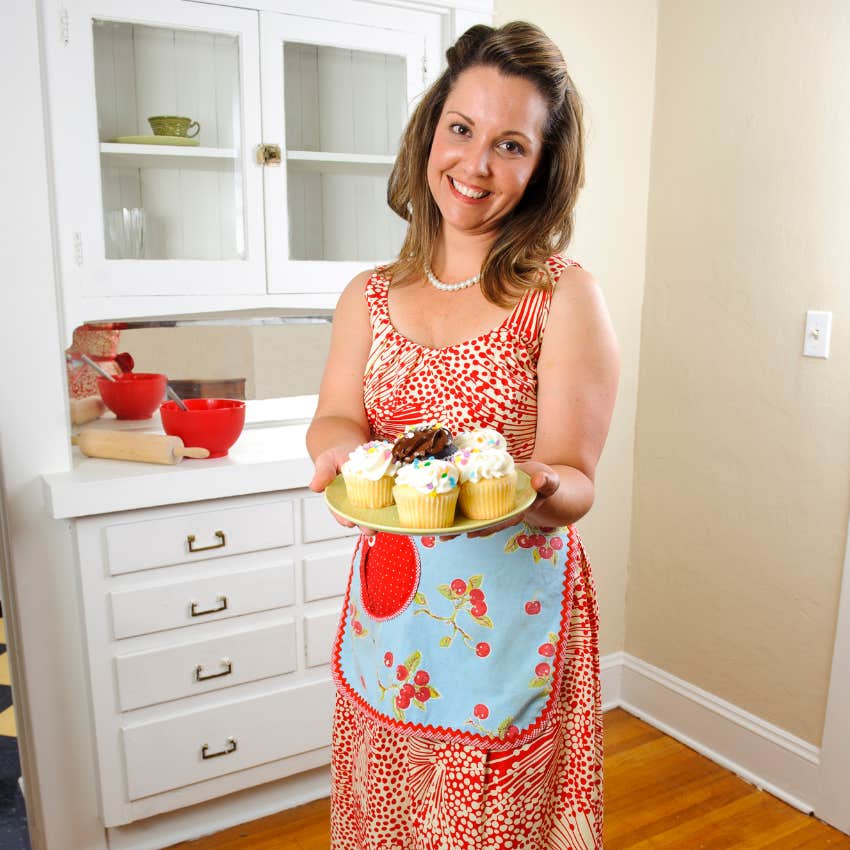English Professor Says Being A 'Tradwife' Online Is 'All For Show' — They Never Do Any Actual Housework
Are tradwives even real?
 SunKids / Shutterstock
SunKids / Shutterstock "Tradwives," or traditional housewives, are taking over social media right now. They are the new wave of mom influencers with millions of followers.
These women embrace traditional gender roles and are supposedly homemaking experts.
One man argued, however, that tradwives are actually not all that they seem, and, in fact, do everything “for show.”
An English professor asserted that 'tradwives' are actually part of the leisure class.
Neil Shyminsky, an English professor from California, shared his thoughts about tradwives in a TikTok video. The video was a stitch with popular tradwife influencer Nara Smith, who could be seen making cereal from scratch. Shyminsky posed a thought-provoking question.
“Have you ever asked yourself why it is that tradwives and other conservative female influencers who promote ‘traditional’ gender roles have all the time in the world to make cereal from scratch, but somehow never seem to record themselves doing essential domestic labor, like vacuuming, trying to get a particularly nasty stain out of a shirt, or scrubbing a toilet?” he asked.
Shyminsky answered his own question: “When they are performing labor in these videos, it’s always something that, strictly speaking, is unnecessary, and they are doing it the hardest way possible. Because the answer is that it is for show. It is all a performance.”
 Photo: RileyCaton / Canva Pro
Photo: RileyCaton / Canva Pro
The English professor then turned to literature to make his point. “In his remarkably prescient 1899 book 'The Theory of the Leisure Class,' Thorstein Veblen coined the terms 'conspicuous consumption’ and ‘conspicuous leisure,’” he said, “suggesting that those with wealth and power, no longer having any economic production to contribute themselves, instead contribute to the production and consumption of leisure.”
“They’re not better than us because they can make their children cereal from scratch,” he explained. “They’re better than us because they are so wealthy and well-off that they have nothing more important to worry about.”
Shyminsky argued that tradwives are really nothing more than symbols.
The professor stated that tradwife videos are not meant to teach someone how to do something. Rather, they are more like a performance.
“These videos are not instructional,” he said. “They are maybe inspirational, but they are always performative. This is not real labor, this is symbolic labor. It is nothing more than social signaling that this woman and her family belong to the leisure class.”
Because these women are performing, they are little more than symbolic trophy wives. They symbolize their family’s wealth and demonstrate what it means to be part of the leisure class.
“Her value to her husband is not in her ability to care for the home or care for the children, right? Anyone who is able to engage in this level of conspicuous leisure has somebody that they are paying to do all of those things,” he said, referring to practical domestic responsibilities.
“No, her value is instead in her ability to perform the role of trophy wife, and to be the ultimate realization and personification of her husband’s socioeconomic prowess.”
Perhaps true tradwives don’t claim to be tradwives.
There’s certainly nothing wrong with being a homemaker or a stay-at-home mom. But those women typically take on usual household responsibilities. Trad wives, on the other hand, might be something of a myth.
If all of their time is spent making food from scratch in an aesthetically pleasing way, when do they clean? When do they care for their children? We haven't even touched on their personal appearance which involves dresses, heels, and red-carpet-ready hair and makeup — the perfect attire for cleaning toilets.
They must have other people who help them, as Shyminsky argued. This then negates the point of being a tradwife — because one is not really living as a traditional housewife at all.
Mary-Faith Martinez is a writer for YourTango who covers entertainment, news and human interest topics.

